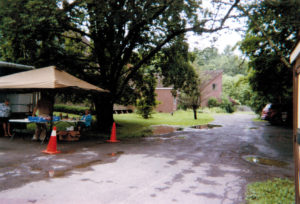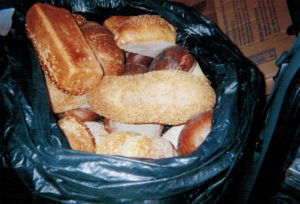Abundance 2: LeAnna, Catherine, and Jane – Women, Mothers, and Hunger in the Food Pantry



Abundance. LeAnna volunteered in the pantry. She had a business degree, a house, two adorable children and a spouse with a fancy career post somewhere in Europe. He decided he wanted nothing to do with her anymore. No money came across the ocean for her and the children. There was no money for taxes she owned on the house, or anything else for that matter.
LeAnna was happy to take the vegetarian items available each week. Her children loved fresh vegetables so there was much to choose from. The girls saw yogurt as a treat.
Catherine had a house full of children including two so close together, I thought they were a set of twins. She couldn’t get it together to work. And, I doubt if she could have gotten employment in our area anyway. This lovely lady had two advanced degrees.
There weren’t many, or possibly any, jobs available in Ulster County in her career field. And, of course, once a woman gets an advanced degree, the lower level jobs aren’t open to her unless she hides the education. Sometimes education can be hidden. Sometimes not. It all depends on the situation. The main thing is to get it off the resume.
Catherine was open-minded about the food she selected. She took anything not tied down. Because she qualified for cases of USDA, Catherine left the pantry with a case each of pasta sauce, canned corn, green beans, vegetarian beans, refried beans.
When she finished shopping, ten-year-old Robert Allen, our next-to-youngest volunteer, brought out the flatbed metal wheeled cart, put her groceries on it, and wheeled them to her car. Little toddler Mikey, our youngest volunteer, ran along behind.
I saw Jane, the young mother who couldn’t work because her husband threw her up against a wall, injuring her back. She had an eight-year-old child she was trying to raise without the luxury of child support.
Jane chose items from shelves where bending and stretching weren’t necessary because she couldn’t do those things.
And, to return to the beginning of Abundance, these three families and referenes to the critics about shoppers all owning upscale cars – Catherine, LeAnna, and Jane owned fairly late model SUV’s in good condition. They invited the criticism of the pantry naysayers when they drove into the parking lot to shop.
Here we had three households, single-headed households in need of food. If not for a couple of years, then for several months.
For some, feeding hungry people means we fed freeloaders. Not all hungry people look needy. Some of the best-dressed people in Woodstock never spent a dime on their clothes. They had no money for clothes so they shopped at Family of Woodstock.
Neither of these households was homeless, although they could be when the tax collector came to call.
Neither of these households was without transportation although they could be if the SUV needed expensive repairs. Nobody in these households looked poverty-stricken although they could be if the car needed repairs.
For the moment, neither LeAnna, Catherine, nor Jane looked poverty-stricken although, they would in time with no child support from the spouse to help with expenses.
These three women had several things in common. They were divorced. They had children. They received no money from the ex-spouse even though each one had a lucrative, influential employment career, money, and a bright future.
There was not a job among them.
There was little or no money for a food budget even.
LeAnna, Catherine, and Jane each lived with abundance on one hand, a large box of unpaid bills on the other hand, and hope, dreams, and fears somewhere in the middle.
The children were eligible for school breakfast and lunch programs. But, that didn’t give them enough food to eat at home. And, there was no lunch program for the mothers.
So, it was off to the pantry. This was a life-changing decision. Using a pantry requires commitment, endurance, and effort. Attitudes about food in particular and life in general change.
Pantry shoppers are often self-disciplined, self-controlled, determined to do what is best for the family.
Freeloaders? What do you think?
Every week when these women shopped I saw myself as a young woman returning from Mexico with my two daughters and nothing but the clothes on my back. There was no way anyone, just by looking at me, would have known how little I had.
Whether we come to the pantry as shoppers, volunteers, or both, all of us are asked by the pantry to leave; the past behind. And, of course, that’s different for everyone.
How can we move forward into a new life if we never give anything up? For some, giving up the past means letting go of the job we lost, the home, the furniture that went in the home, maybe the family, self-esteem, the car, good health.
What happens in the pantry, this shopping, this offloading, has the potential to be the greatest journey of one’s life. The hungry person learns things in new ways, and sees things never noticed before. And, finally, there is the knowledge that anything can happen. When all is said and done, things will never be the same again. Better off for the experience, thoughts change.
Beliefs and core values are found.
I’m sticking my neck out here to say this.
Being hunger in 21st century America is a spiritual journey involving miracles, forgiveness, endurance, and spiritual healing. It’s all about discovering that it’s never too late to be who you really are.
That’s what this story is all about.
Thank you for reading this blog post in two parts. Please forward it to your preferred social media network.
Thurman Greco
The Face of Hunger/The Face of Hope
Every Monday, she brings her little granddaughter to the pantry –
Sue, maybe 4, is shy – absolutely beautiful – and still totally unaware of her situation:
White
Mother working 2+ jobs
Not enough to eat
Threadbare clothes
This lovely child takes pleasure in the smallest treats. Today her treat is a can of juice one of the volunteers found that’s not yet dented.
Her grandmother is teaching her to:
stand in line quietly
smile
say “thank you”.
How these mothers and grandmothers can get these little children to stand perfectly still and quiet for the time it takes to go through the line is completely beyond me.
But, back to the story.They get a 3-day supply of food which will last for 7 days, this struggling pair.
She’s always happy visit the pantry. It’s got 2 rooms so their next stop is the produce room where they have apples today.
Garrett and Susanne also keep the place well stocked with children’s books so there will be another treat for her.
When I see this pair, I see the universal grandmother and granddaughter next door. They are us. They are our neighbors. They are our cousins. I am reminded that we do not live in a we/they world. The hungry are us.
I’ve been working in a food pantry for years…certainly long enough to have become hardened to the reality and face of hunger. However, that is not what has happened. If anything, I’m more sensitive to the issues. I now truly believe that humans are not meant to suffer hunger and poverty. We are not meant to turn our heads away from the issue of hunger.
Most poor families in America are working families. The low wages earned by the millions of hungry Americans are not enough to cover the cost of housing, medical care, child care, transportation, clothing and food.
As the Struggling Class begins cutting food because the budget no longer allows it, they begin by cutting out meat. If that is not enough, they go to the second level and cut out meat, vegetables and eat eat only cereals.
Finally, it means cutting out an entire meal every day.
Food Pantries offer the hope of at least not starving to death. When people visit food pantries they can get food which they otherwise could not purchase. This brings hope to us all – not only the hungry but to those who work to appease the situation.
http://www.allianceforpositivehealth.org
http://www.foodbankofhudsonvalley.org
Thank you for reading this blog/book.
Please refer this article to your preferred social media network.
Thurman Greco





